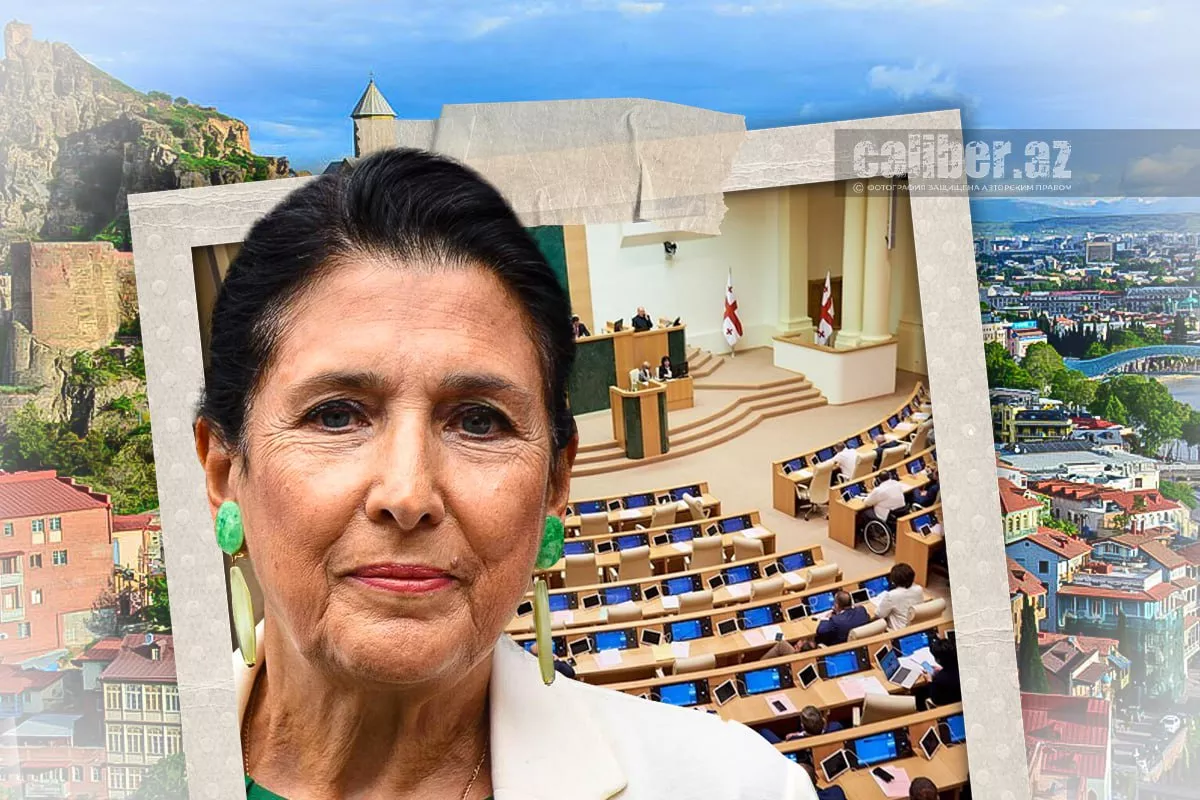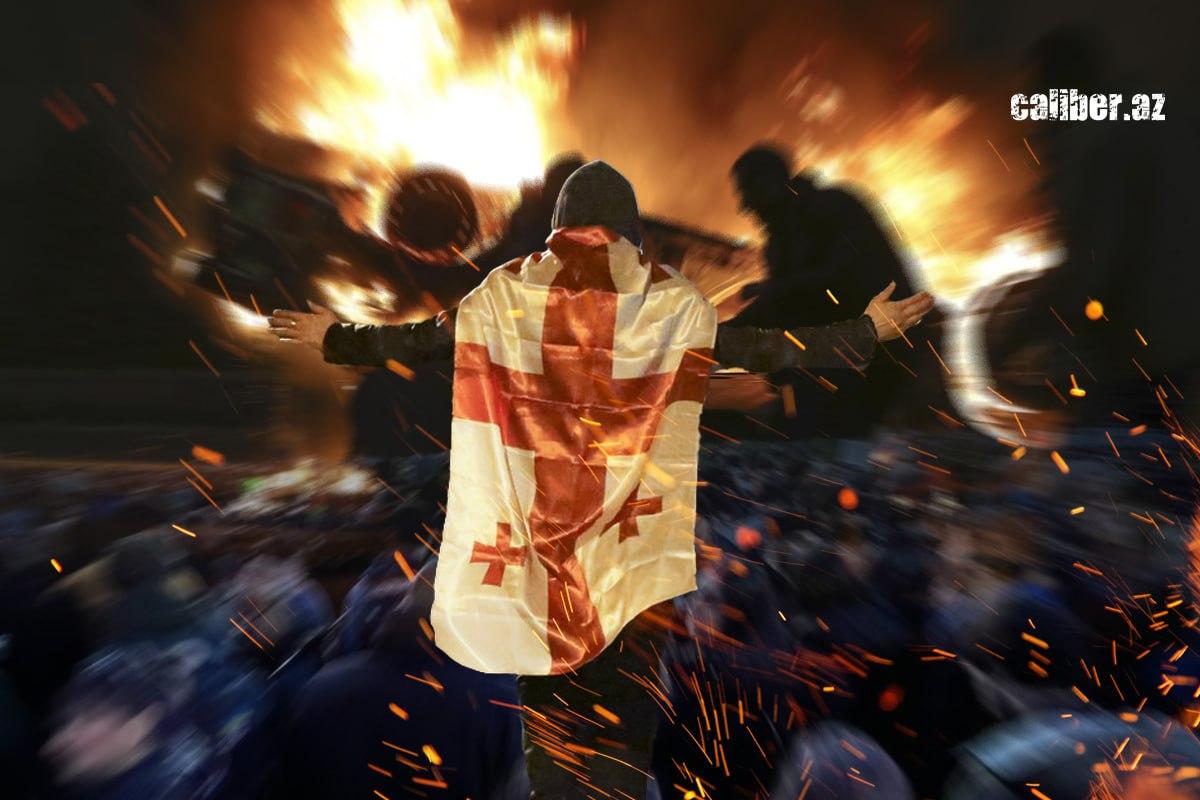Dangerous push for civil war in Georgia Zourabichvili’s ultimatum
The risk of a coup and civil war in Georgia remains a pressing concern. External forces are capitalizing on the unusual situation in the country, which currently finds itself with two presidents: the outgoing Salome Zourabichvili and the newly elected Mikheil Kavelashvili. Zourabichvili has issued an ultimatum, demanding that the government announce a date for new elections by December 29, the final day of her term.
Over the past weekend, significant resources were mobilized to bolster support for Zourabichvili as her presidency nears its end. Pro-Western NGOs activated their networks, rallying employees and supporters to create the appearance of widespread public backing for Zourabichvili. Against the backdrop of this coordinated effort by the pro-Western opposition, Zourabichvili delivered her ultimatum to the Georgian authorities on the evening of December 22 from Rustaveli Avenue.
“I invite his party… Kobakhidze, Papuashvili, and anyone else you wish. I invite the parties that participated in the elections, as well as the organizations that monitored them. Come to the Orbeliani Palace. Come, and let’s talk. But there is only one thing to discuss—when and how to hold the elections. There is little time for this negotiation. […] Whoever wants everything to end well in this country, come to the palace. This invitation also applies to Ivanishvili, because he manages everything. I am ready for us to sit down and discuss how to schedule the elections, but the date for scheduling them must be agreed upon by the 29th,” declared Zourabichvili.

Naturally, Zourabichvili’s ultimatum was immediately rejected. “This is incredible and not even funny anymore. It’s impossible to discuss this seriously. Why should there be snap elections? There must be a valid reason for that. Can the opposition’s madness be such a reason?” stated Mamuka Mdinaradze, the leader of the parliamentary majority and executive secretary of the Georgian Dream party, categorically ruling out the possibility of new elections as demanded by the opposition.
Even before Zourabichvili issued her ultimatum, Prime Minister Irakli Kobakhidze had already dismissed the prospect of early elections entirely. He also warned her of imprisonment should she unilaterally attempt to call for new elections or try to remain in the presidential residence. “On the 29th, she will have to step down. We’ll see where she continues her life: behind bars or as a free person. I believe she will have the sense not to violate the criminal code,” Kobakhidze stated.
According to the Prime Minister, parliamentary elections in Georgia can only be called under specific circumstances: if the Central Election Commission or the Constitutional Court annuls the results of previous elections, when the four-year term of parliamentary deputies expires, or in the case of snap elections triggered by a parliamentary vote of no confidence in the government. None of these conditions currently exist in Georgia.
The following day, Salome Zourabichvili reiterated her ultimatum, this time accompanied by threats to "overthrow" the government. “Time is running out; this crisis can no longer wait. This week, before December 29, I am ready to meet—in any format. But if Bidzina Ivanishvili refuses to engage in dialogue, there will be an alternative plan. We will still secure new elections, even by overthrowing this regime. The choice is yours: dismantling the regime as an alternative, or dialogue, compromise, and concession. You must concede,” Zourabichvili demanded.
Another deeply troubling aspect of Zourabichvili’s ultimatum, issued on December 22, was her self-declaration as the "Commander-in-Chief" of Georgia’s armed forces. She emphasized that the military is armed and trained by “partners,” referring to Western countries. “ I will remain loyal to the Georgian Army—its veterans, soldiers, and steadfast partners who built and strengthened it. I am, and will remain, its Commander-in-Chief!” Zourabichvili declared.
In the worldview of French-born Zourabichvili, it seems Georgian soldiers and officers are expected to show loyalty not to Georgia and its people, but to these "partners." Presumably, this includes her perceived benefactor, French President Emmanuel Macron.
It would be naïve to assume that Western intelligence agencies, including French ones, have not infiltrated Georgia’s military. This poses a significant risk: in a moment of crisis, such infiltrated personnel could be manipulated by their external "handlers" into staging an anti-government rebellion or committing treason against their country and its people.
In her ultimatum to Georgian Dream, as she demands repeat elections, Zourabichvili appears to hint at such a scenario.
Opposition figures, including Mamuka Khazaradze, leader of Strong Georgia, and Zurab Japaridze, leader of the Coalition for Change, have called on the military to boycott the inauguration of Georgia’s new president, Mikheil Kavelashvili, on December 29, 2024, and to refuse to obey what they describe as an "illegitimate government." In response, Georgia’s ruling party urged the Prosecutor’s Office to investigate these statements directed at the country’s armed forces. “A direct call for disobedience is a criminal act,” stated Mamuka Mdinaradze, leader of the parliamentary majority.

The situation in Georgia is on the brink of becoming critical. Two possible scenarios lie ahead. Either the current authorities will neutralize and disarm Zourabichvili, forcing her to permanently return to her native France or arresting her and holding her accountable for her actions against Georgia. Alternatively, Zourabichvili, acting on the instructions of external handlers, could ignite a civil war within the country.
In her attempt to “cling” to Georgia in the event of a failed coup in Tbilisi, Zourabichvili might resort to tearing the Georgian state apart. There are already visible signs that Zourabichvili, backed by France, may shift her focus toward regional separatism. A particularly alarming and dangerous development in recent opposition activities has been the overt emphasis on the regional distinctiveness of various Georgian population groups. To grasp the potential danger of this, one must delve into some historical context.
Like many nations, the Georgian people are composed of local regional and subethnic groups—Kartlians, Kakhetians, Imeretians, Gurians, Mingrelians, Svans, and others. During the Russian Empire, many of these groups were categorized separately; for instance, Mingrelians, Svans, Gurians, and Imeretians were often listed as distinct ethnicities. However, historically, all of these groups have been considered Georgians, despite linguistic differences, such as those between Mingrelians and Svans.
A unifying factor in the formation of a single Georgian identity was the Georgian Orthodox Church, which played a central role. As a result, most indigenous South Caucasian Christians were "by default" considered Georgians. Historically, this also included Abkhazians. For instance, the Abkhaz elite—nobles and princes—largely regarded themselves as Georgians during that time.
The Soviet regime artificially "extracted" Abkhazians from the already emerging unified Georgian historical and cultural community, creating a separate "republic" and thereby sowing the seeds of Abkhaz separatism. In the 1920s and 1930s, there were plans to create separate "nations" out of Mingrelians, Svans, and Adjarians. However, these plans were ultimately abandoned, and further fragmentation of Georgia was avoided.
Nonetheless, dormant “time bombs” in the form of potential regional separatism were planted. It is plausible that, should attempts to bring Salome Zourabichvili and the pro-Western opposition to power in Tbilisi fail, external forces seeking to destabilize Georgia and the South Caucasus as a whole may resort to igniting regional separatism. In this context, separatist movements supported by Paris and Yerevan, such as the Armenian nationalist cause in Samtskhe-Javakheti, could be mobilized at any moment to exacerbate the situation.
This appears to be the intention behind the opposition’s organization of protest marches involving regional and subethnic groups in Tbilisi. From December 20–22, Tbilisi witnessed marches by Gurian, Adjarian, Mingrelian, Svan, Rachan, and Kakhetian groups, among others, with the Mingrelian march being one of the largest. These protests seem to be a contingency plan by external coordinators of the unrest in Georgia, prepared in case they fail to execute a coup, change the government, or establish a foothold in the presidential residence in Tbilisi.
If this primary plan fails, a scenario involving regional separatism could be set into motion. This risk is even more significant if Salome Zourabichvili and the pro-Western opposition decide to designate a specific region as their base and declare a "government" there. The greatest risk of destabilization lies in Mingrelia and its administrative centre, Zugdidi, which borders separatist Abkhazia. However, there is also a possibility that Zourabichvili’s planned insurrection could attempt to establish its base in other regions.
For the stability of Georgia, it is crucial that after December 29, there is only one president—legally elected Mikheil Kavelashvili. Should the West succeed in ensuring that, after this date, there are two presidents in Georgia—Kavelashvili and the self-proclaimed Zourabichvili—it could spell disaster for Georgian statehood. This scenario risks the emergence of two armies, two governments, and the looming threat of civil war, the flames of which could quickly spread beyond Georgia’s borders.
Vladimir Tskhvediani, Georgia, for Caliber.Az








